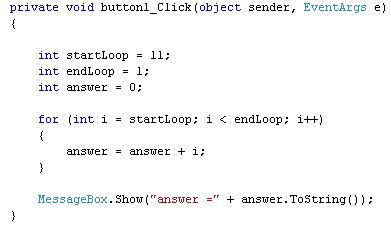Logic Lost and Found: Correcting Logical Errors in Your Code

When developing software, logical errors are a common occurrence that can lead to unexpected behavior or even crashes. These errors can be notoriously difficult to track down and correct, as they often reside in complex or convoluted code paths.

To effectively address logical errors, a systematic approach is essential. Here’s a comprehensive guide to help you find and fix these elusive bugs:

1. Identify Symptoms:
Start by pinpointing the specific symptoms of the logical error. This could include:
- Incorrect output or behavior
- Unexpected exceptions or errors
- Inconsistencies between expected results and actual results
2. Divide and Conquer:
Break down the code into smaller, manageable chunks and test each section independently. By isolating the issue, you can more easily pinpoint the specific line or statement causing the error.
3. Review Branch and Condition Logic:
Logical errors often stem from incorrect branching or condition checking. Carefully review all if-else statements, loops, and other conditional expressions to ensure they are correctly evaluating and executing the intended path.
4. Check Data Integrity:
Data validity is paramount. Verify that data is being received, stored, and manipulated correctly throughout the code. Ensure data types are consistent and unexpected values are handled gracefully.
5. Use Assertions and Logging:
Incorporate assertions or logging statements into your code to check for expected conditions or output. This will help detect errors during runtime and provide valuable insights for debugging.
6. Step-by-Step Debugging:
Use a debugger to step through your code line-by-line. This allows you to observe variable values, call stack, and execution flow, providing detailed information to pinpoint the source of the error.
7. Seek External Help:
If all else fails, consider seeking help from colleagues, forums, or online resources. A fresh pair of eyes and different perspectives can sometimes provide valuable insights.
8. Preventative Measures:
To minimize the occurrence of logical errors in the future:
- Write clear and concise code with appropriate documentation.
- Use unit testing to verify individual code sections.
- Implement rigorous code reviews.
Conclusion:
Correcting logical errors requires patience, perseverance, and a systematic approach. By following these steps, developers can effectively track down and fix these elusive bugs, ensuring robust and reliable software.## Logic Lost And Found: Correcting Logical Errors In Your Code
Executive Summary:
In the realm of coding, logical errors reign supreme as one of the most elusive and frustrating obstacles programmers face. These errors, stemming from flaws in the underlying logic of a program, can manifest in cryptic error messages or perplexing program behavior. To combat these challenges, it is imperative to embark on a journey to recover lost logic and restore order to our code.
Introduction:
Logical errors, the bane of programmers, arise when a program’s logic deviates from the intended design. These errors can lurk in the shadows, concealed within seemingly innocuous lines of code, only revealing their presence through mysterious error messages or unexpected program behavior. To uncover and rectify these errors, a keen eye and a structured approach are essential.
FAQs:
1. What are the common types of logical errors?
Logical errors can range from simple typos to complex flaws in program design. Some common types include:
- Infinite loops: When a program becomes trapped in an endless loop, it may become unresponsive or consume excessive resources.
- Logic bugs: Errors in conditional statements or logic flow can lead to incorrect program behavior.
- Off-by-one errors: These errors occur when a loop or array index is incremented or decremented by an incorrect amount.
- Null pointer exceptions: Attempting to access an uninitialized or null pointer can lead to catastrophic program failures.
- Memory leaks: Failure to properly release allocated memory can result in memory depletion and slow program performance.
2. What techniques can I use to find logical errors?
Logical errors often require a combination of tools and techniques to uncover. Some effective methods include:
- Debugging statements: Adding strategic print statements to the code can provide insights into program behavior.
- Breakpoints: Setting breakpoints at key points in the code allows for step-by-step execution and variable inspection.
- Profiling tools: These tools analyze program performance and can help identify bottlenecks and performance issues.
- Static analysis tools: These tools scan code for potential errors, such as memory leaks or uninitialized variables, before execution.
- Peer code review: Seeking input from a fellow programmer can provide a fresh perspective and help spot logical inconsistencies.
3. How can I prevent logical errors from occurring in the first place?
Preventing logical errors is a crucial aspect of writing robust code. Consider the following strategies:
- Thorough planning: Carefully design the logic of your program before writing any code.
- Unit testing: Write small, focused tests to verify the logic and functionality of individual code modules.
- Code reviews: Regularly review your code, both individually and with colleagues, to identify potential errors.
- Exception handling: Implement error handling mechanisms to gracefully handle unexpected situations and prevent program crashes.
- Formal verification: For critical systems, consider using formal verification techniques to mathematically prove the correctness of the code.
Top 5 Subtopics:
1. Branching Logic
Branching logic allows programs to execute different code paths based on certain conditions. Logical errors in branching logic can lead to incorrect program behavior or unexpected jumps.
- Conditional statements: Ensure that conditional statements are correctly formulated and cover all possible cases.
- Switch statements: Verify that default cases are included and that no cases “fall through” unintentionally.
- Looping logic: Carefully consider the loop conditions and increment/decrement operations to avoid infinite loops or off-by-one errors.
2. Null Pointer Exceptions
Null pointer exceptions arise when an attempt is made to access an uninitialized or null pointer. These errors can result in immediate program termination.
- Pointer initialization: Always initialize pointers with proper values before using them.
- Input validation: Check for null input values and handle them gracefully.
- Dereferencing: Ensure that pointers are not dereferenced before they are assigned a valid reference.
3. Memory Management
Proper memory management is essential for preventing memory leaks, memory corruption, and other memory-related issues. Logical errors in memory management can lead to system instability.
- Memory allocation: Use appropriate memory allocation functions and ensure that the allocated memory is properly released.
- Deallocation: When finished with allocated memory, release it using appropriate deallocation functions.
- Memory leaks: Track memory usage carefully to identify and fix potential memory leaks.
4. Concurrency and Synchronization
In concurrent programming, logical errors can arise from race conditions, deadlocks, and other synchronization issues.
- Race conditions: Protect shared resources using synchronization primitives such as mutexes and locks.
- Deadlocks: Avoid situations where threads wait on each other indefinitely.
- Synchronization primitives: Use synchronization primitives correctly to ensure proper data consistency and prevent race conditions.
5. Exception Handling
Exception handling allows programs to recover from unexpected errors gracefully. Logical errors in exception handling can lead to program crashes or incorrect error recovery.
- Try-catch blocks: Use try-catch blocks to handle potential exceptions.
- Exception propagation: Propagate exceptions to higher levels of the program if they cannot be handled locally.
- Finally blocks: Use finally blocks to perform cleanup actions regardless of whether an exception occurred.
Conclusion:
Logical errors, the nemesis of programmers, can wreak havoc on our code. By understanding the common types of logical errors, utilizing effective debugging techniques, and adopting proactive error prevention strategies, we can reclaim lost logic and restore order to our programming endeavors. Remember, the journey to error-free code is a continuous one, requiring diligence, attention to detail, and a relentless pursuit of logical precision.
Keyword Tags:
- Logic Debugging
- Error Correction
- Code Analysis
- Debugging Techniques
- Error Handling


